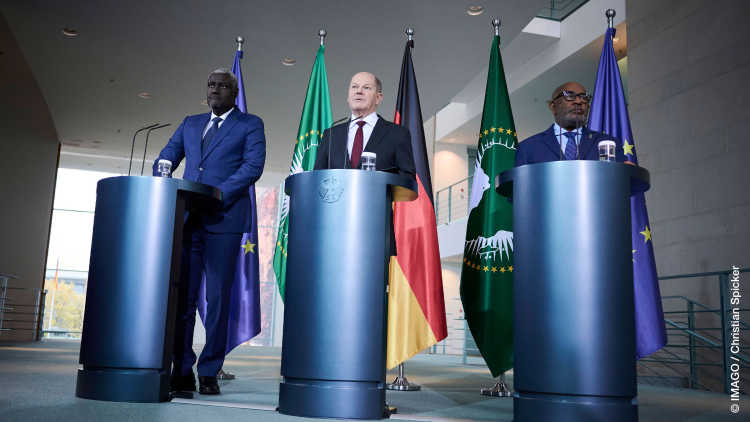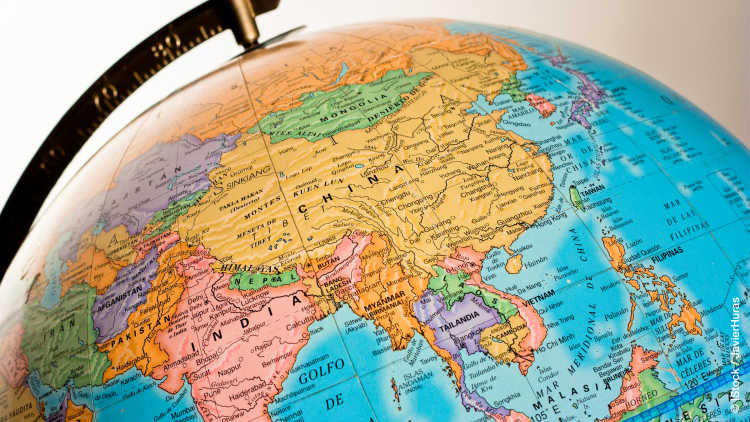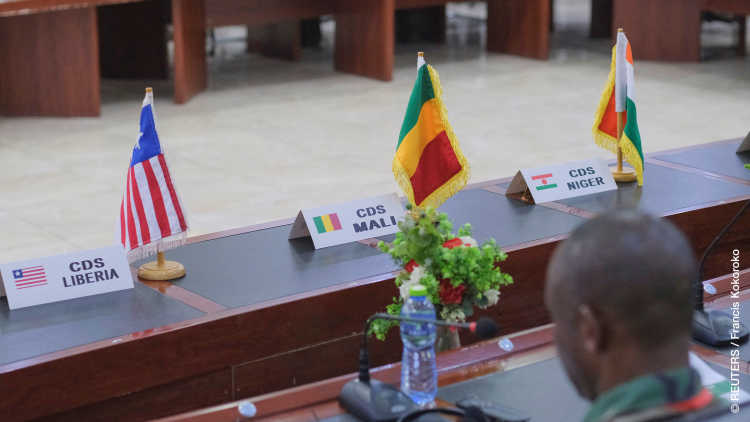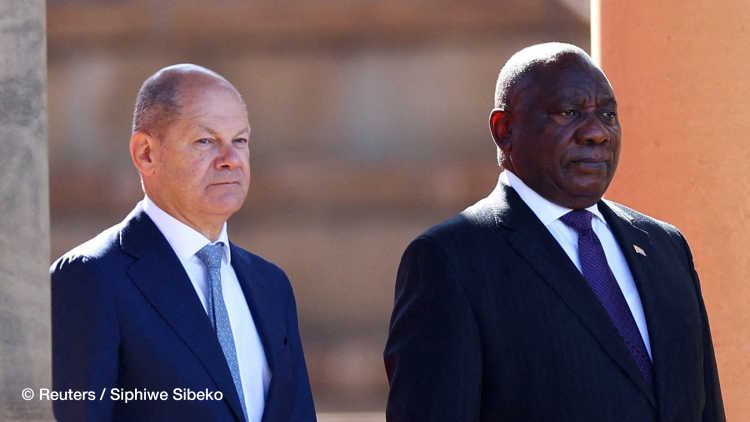- Home
- Publications
- GIGA Focus
- Afrika als Leerstelle in der Nationalen Sicherheitsstrategie?
GIGA Focus Africa
Africa’s Marginal Role in Germany’s First National Security Strategy
Number 6 | 2023 | ISSN: 1862-3603

African states and the African Union do not feature prominently as political actors in Germany’s National Security Strategy. Yet the coup in Niger, with its direct impact on the withdrawal of the Bundeswehr from Mali, is an example of how political developments on the African continent have far-reaching consequences for German foreign and security policy.
The National Security Strategy is characterised by the spirit of the so-called Zeitenwende. This emphasis overlooks that Russia’s war of aggression against Ukraine – which constituted a turning point for Europe, was perceived differently by African countries, which have experienced decades of violent conflict on the continent.
Although the strategy document is based on the premise of a multipolar world order, the focus is on Western partners such as the EU and NATO. The BRICS and the G20, which are not even mentioned by name, play a marginal role.
In contrast to the security strategies of France, Great Britain, and the United States, the African continent is neglected in the German security strategy and mentioned only twice. Nevertheless, the concept of “integrated security” – which foresees a better integration of military engagement, diplomacy, and development cooperation – offers important impetus for future cooperation with Africa.
Policy Implications
Germany and the EU must better adapt their foreign and security policy to the increasing presence of China and Russia on the African continent. African states have shown that they are flexible in their choice of partners. This not only poses challenges for the West, but also presents opportunities if Western countries succeed in making better offers when it comes to cooperation.
Footnotes
References
Afrobarometer (2019), ‘Updata-ing’ the Narrative about African Migration, Zugriff 22. November 2023.
Basedau, Matthias und Julia Grauvogel (2023), Ten Things to Watch in Africa in 2023, GIGA Focus Afrika, 1, Januar, Zugriff 23. November 2023.
Bundesrepublik Deutschland (2023), Wehrhaft. Resilient. Nachhaltig. Integrierte Sicherheit für Deutschland, Zugriff 22. November 2023.
FAO (2022), The State of Food Security and Nutrition in the World 2022, Zugriff 22. November 2023.
Französische Republik (2022), Nationale strategische Überprüfung, Zugriff 22. November 2023.
Matthay, Sabine (2021), Was der „vernetzte Ansatz“ beim Afghanistan-Einsatz gebracht hat – und was nicht, Deutschlandfunk, 3. Dezember, Zugriff 22. November 2023.
Plagemann, Johannes und Henrik Maihack (2023), Wir sind nicht alle: Der Globale Süden und die Ignoranz des Westens, Berlin: C.H. Beck.
Tull, Denis (2020), Deutsches und internationales Krisenmanagement im Sahel, Berlin: SWP, Zugriff 22. November 2023.
United Kingdom (2023), Integrated Review Refresh 2023: Responding to a More Contested and Volatile World, Zugriff 22. November 2023.
United Kingdom (2010), A Strong Britain in an Age of Uncertainty: The National Security Strategy, Zugriff 22. November 2023.
White House (2022), National Security Strategy, Zugriff 22. November 2023.
Editor GIGA Focus Africa
Editorial Department GIGA Focus Africa
Regional Institutes
Research Programmes
How to cite this article
Grauvogel, Julia (2023), Africa’s Marginal Role in Germany’s First National Security Strategy, GIGA Focus Africa, 6, Hamburg: German Institute for Global and Area Studies (GIGA), https://doi.org/10.57671/gfaf-23061
Imprint
The GIGA Focus is an Open Access publication and can be read on the Internet and downloaded free of charge at www.giga-hamburg.de/en/publications/giga-focus. According to the conditions of the Creative-Commons license Attribution-No Derivative Works 3.0, this publication may be freely duplicated, circulated, and made accessible to the public. The particular conditions include the correct indication of the initial publication as GIGA Focus and no changes in or abbreviation of texts.
The German Institute for Global and Area Studies (GIGA) – Leibniz-Institut für Globale und Regionale Studien in Hamburg publishes the Focus series on Africa, Asia, Latin America, the Middle East and global issues. The GIGA Focus is edited and published by the GIGA. The views and opinions expressed are solely those of the authors and do not necessarily reflect those of the institute. Authors alone are responsible for the content of their articles. GIGA and the authors cannot be held liable for any errors and omissions, or for any consequences arising from the use of the information provided.






















